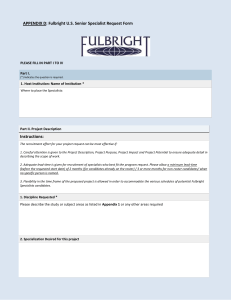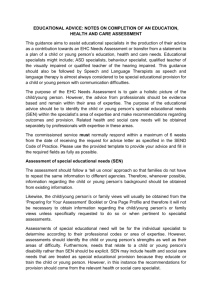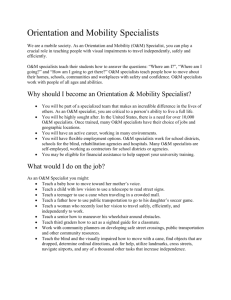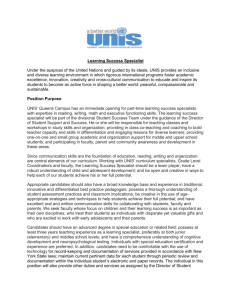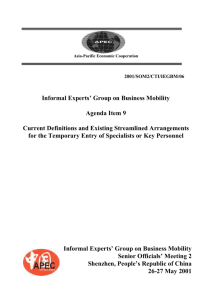Responsibility for Collection Development
advertisement
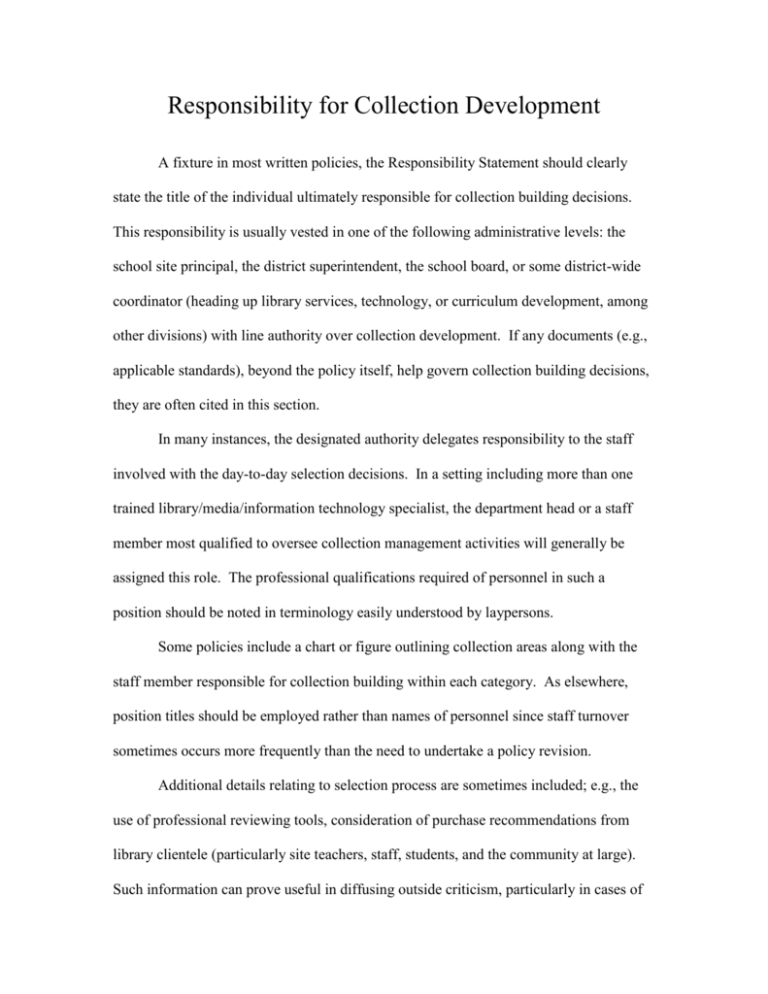
Responsibility for Collection Development A fixture in most written policies, the Responsibility Statement should clearly state the title of the individual ultimately responsible for collection building decisions. This responsibility is usually vested in one of the following administrative levels: the school site principal, the district superintendent, the school board, or some district-wide coordinator (heading up library services, technology, or curriculum development, among other divisions) with line authority over collection development. If any documents (e.g., applicable standards), beyond the policy itself, help govern collection building decisions, they are often cited in this section. In many instances, the designated authority delegates responsibility to the staff involved with the day-to-day selection decisions. In a setting including more than one trained library/media/information technology specialist, the department head or a staff member most qualified to oversee collection management activities will generally be assigned this role. The professional qualifications required of personnel in such a position should be noted in terminology easily understood by laypersons. Some policies include a chart or figure outlining collection areas along with the staff member responsible for collection building within each category. As elsewhere, position titles should be employed rather than names of personnel since staff turnover sometimes occurs more frequently than the need to undertake a policy revision. Additional details relating to selection process are sometimes included; e.g., the use of professional reviewing tools, consideration of purchase recommendations from library clientele (particularly site teachers, staff, students, and the community at large). Such information can prove useful in diffusing outside criticism, particularly in cases of attempted censorship. If lengthy explanations are considered necessary, however, they probably should be included in their own sections. Sample Policies The variety of approaches in responsibility statements generally reflect the differing governance of the respective school libraries. However, as the excerpts below make clear, libraries without exception advocate the administration of library affairs such as collection building by trained professionals. Aldine Independent School District Library Media Services Department Policy and Procedures Manual Responsibilities of the Library Media Specialist As stated in Information Power: Building Partnership for Learning, library media specialists have always drawn upon a distinctive expertise about information, and a growing body of research is demonstrating the unique contribution this expertise can bring to student achievement. Especially in recent years, the profession has pioneered in identifying and meeting learning needs brought about by the rapid and continuing expansion of information delivered through a variety of new technologies. As an essential partner who both contributes to and draws from the expertise of the entire learning community, the library media specialist plays a role that begins with promoting and reinforcing students’ interests and abilities in reading, listening, and viewing; expands to include fostering the full range of information concepts, strategies, and abilities that students must master to profit from the global resources that are quite literally at their fingertips; and includes developing the full range of abilities that students need to interact effectively with information and to construct meaningful knowledge. To fulfill this role, the effective library media specialist draws upon a vision for the student-centered library media program that is based on collaboration, leadership, and technology. The library media specialist does this by acting as a teacher, an instructional partner, an information specialist, and a program administrator. Relationships to other School Personnel: Principal Principals have a special role in developing and supporting the Library Media Center. The principal can evaluate the total interrelationship of the community and the school and is the library media specialist’s most knowledgeable source of information and guidance. Principals assist the Library Media Center by: acting as a link to and from the district level; endorsing the Library Media Center program to teachers, students and parents; making school funds available whenever possible; observing the Library Media Center program, suggesting improvements, and supporting new programs; and keeping the library media specialist informed about curriculum changes. The do’s of a library specialist approaching a school administrator are as follows: Do make a scheduled appointment. Prepare to discuss issues. Do plan ahead. Make notes of points you want to emphasize. Do prepare a log-range plan of quantitative and qualitative goals for the year. Do take along statistics and research for support. Do prepare and submit a detailed request list for the library. Do emphasize the needs of the students and faculty members for media services. Do emphasize the importance of the paraprofessional doing clerical work so that you, as a professional, will be accessible to students and teachers. Do be considerable of the administrator’s time, especially during the first two weeks of school. Do approach funding requests in a positive, timely, and enthusiastic manner. Do state your needs with the assurance that they are essential. Do see administrators two weeks after school begins. Do maintain a professional attitude at all times. District Director of Library Media Services The district Director of Library Media Services and Computer Services is a resource person for the campus library media staff and carries out responsibilities in the following areas: Consulting with administration on guidelines for the district Library Media Center program. Developing and implementing business policies and procedures. Helping to establish policy and set standards for the Library media Services department. Acting as a communication channel between the administration and school library media specialist. Acting as a communication link between the Resource Center staff and library media specialists. Interpreting district goals, objectives, procedures and budget to new schools. Allocating local and federal funds for the purchase of Library Media Center basic collections for new schools. Allocating local and federal funds for the purchase of Library Media Center books and audiovisual materials. Overseeing the selection and organization of Library Media Center basic collections for new schools. Planning and organizing for Library Media Center aids and teachers in-service training with the help of specialists and aides. Informing specialists and principals of professional growth conferences, workshops, etc., and encouraging their attendence. Observing the Library Media Centers and consulting with specialists and/or principals on improving the program and facilities. Recommending materials and equipment to other district personnel. Providing resources for district curriculum writers as requested. Orienting new library media personnel. Consulting with Library media specialists regarding any special problems. Arranging and conducting bi-monthly meetings for library media specialists. Acting as a link to the community, regional, and state level resources including public library systems and academic libraries, regional service centers, etc. Preparing necessary business forms and compiling records on the district level. Preparing reports as requested by administrative personnel. Library Management Systems Administrator The Library Management Systems Administrator has the following responsibilities: Oversees the operation and use of the library automation system and defines fiscal needs to ensure that resources address the mission of Aldine ISD. Provides training on technology hardware and software as applicable to the library automation systems, as well as expanding technological developments. Coordinates and is responsible for the pre-installation of automation systems at new campuses. Serves as system administrator for the library automation in all school Library Media Centers and provides opportunities for staff development regarding network software. Serves as liaison between school districts, companies, vendors, organizations and district personnel. Analyzes facility and equipment needs for optimum use of the library automation system; utilizes information to make recommended changes or adjustments. Supervises and assists with the automated cataloging of instructional materials in order to provide the best access of these materials to students and teachers. Participates in the creation of a bibliographic and local authority database that is accurate, complete, and which will provide ready access to management. Performs original cataloging of print and non-print materials as directed by the Director of Library Media Services according to national standards (AACR2, Dewey Decimal System, Library of Congress Subject Headings, MARC formatting) for use in the district-wide catalog databases. Coordinates the retrospective conversion of existing bibliographic records to MARC format for the district-wide catalog database of all library holdings. Supervises the maintenance of the district-wide database, thereby maintaining data integrity. Develops and implements policies and procedures for works of original cataloging. Serves as aresource person to library media specialists on automation, cataloging and technical trends and development affecting the library program. (revised June 1999) Bowling Green [Ohio] City School District Media Center Materials Selection Policy Selection Personnel The Bowling Green City Board of Education is the legal body in which rests the ultimate responsibility for the selection of materials for the Bowling Green City Schools Media Centers. The responsibility for the actual selection of materials for the school media center shall be delegated to the professional librarian of each school based on the goals of the school system and the curriculum. The personnel who assist in the actual selection of materials for the media centers must include the professional librarians, and may include other media specialists, curriculum consultants, teaching staff, administrators, other staff, students and parents. (last revised October 2002; http://winslo.state.oh.us/publib/material-bg.html) Chico Unified School District School Library Media Centers District Plan Responsibility for Selection The Board of Trustees is responsible for all materials in the library information centers of CUSD. The responsibility for selection of the materials is delegated to certified library media teachers. The library media teachers coordinate, select, and purchase all materials. While extensive advice is sought from administrators, teachers, specialists, teaching assistants, students, parents and others affiliated with the CUSD, final decisions for the selection of all materials lies with certified library media teachers. (published December 9, 1998; http://panther.chs.chico.k12.ca.us/libr/Plan/libplan.html) Delaware Valley School District Library Collection Policy Responsibility The superintendent or designee will direct establishment of criteria to be followed by the Delaware Valley School District librarians under the directionof the building administrators. (adopted March 19, 1987) Groton Public Schools Media Technology Services Policies & Procedures RESPONSIBILITY 1. The Groton Board of Education assumes legal responsibility for the selection of materials in the district’s library information centers. 2. Responsibility for the selection of all library materials is delegated to the professional library staff through the building principal. The selection process involves open opportunity for consultation with administrators, faculty, supervisors, and students. Selection is based upon evaluation by the professional library staff, using professional library tools and other review media. 3. In selecting materials, library, staff, administrators, and faculty are guided by the principles incorporated in the School Library Bill of Rights, the Freedom to Read Statement, standards adopted by the American Association of School Librarians, and the School Library Standards of the Connecticut State Department of Education. 4. The collection will be developed systematically, ensuring a well-balanced coverage of subjects, opinions, and formats and a wide range of materials on various levels of difficulty supporting the diverse interests, needs, and viewpoints of the school community. (last updated: March 8, 1999; http://www.groton.k12.ct.us/mts/matselect.htm)

